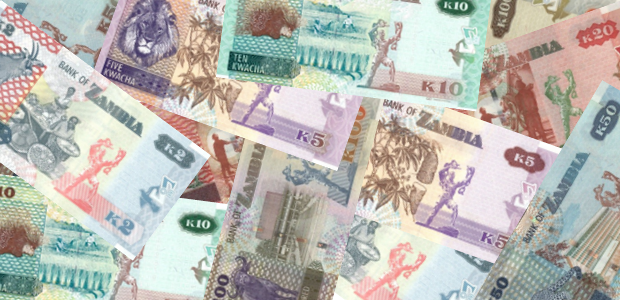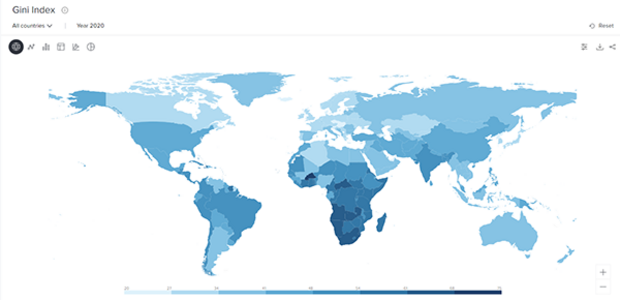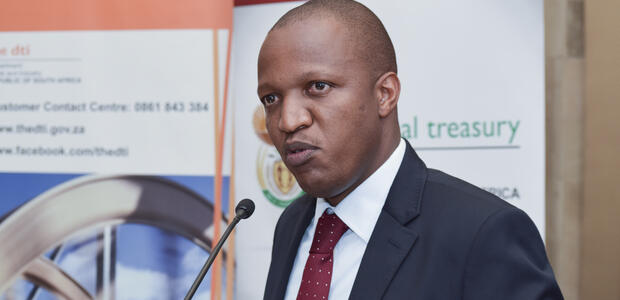Blog
Studying COVID-19 through the lens of microsimulation: The role of tax and benefit policies in alleviating poverty and inequality
As the crisis caused by the COVID-19 pandemic evolves, developing nations are struggling to deliver economic assistance and public services to their...
Blog
Late development, early adoption – how new technology is reshaping the future of structural change

by
Lukas Schlogl
December 2020
Technological catch-up is bringing new asynchronies to development pathways. What does this mean for employment, globalization, and inequality? A...
Blog
The developer’s dilemma in India – the role of politics and economic ideology
by
Saon Ray, Sabyasachi Kar
December 2020
Policy makers seeking inclusive growth frequently face the developer’s dilemma between prioritizing structural transformation, which is potentially...
Blog
35 years of research for change – what's next?: Building just societies
To celebrate its 35th birthday, UNU-WIDER has looked back at some of its greatest achievements. As the year closes, Armida Alisjahbana, Kunal Sen...
Blog
New WIID Companion to improve the study of inequality

by
Carlos Gradín
April 2021
There is a growing need to understand income inequality trends and how they interplay with other social, economic, and political outcomes, both at the...
Blog
35 years of research for change: Bringing inequality to the fore (1998-2020)
UNU-WIDER released the world’s first estimates of the global wealth distribution in 2007 – one result of a 2004–05 project, ‘Personal Assets from a...
Research Brief
Does exchange rate volatility amplify existing inequalities in South Africa?
Even though poverty and inequality have been of overriding concern in South Africa’s development policies and programmes since its democratization in 1994, measures of poverty, inequality, and related phenomena in the country do not show a clear...
Working Paper
The social psychology of economic inequality
In this review, I provide an overview of the literature investigating the social psychology of economic inequality, focusing on individuals’ understandings, perceptions, and reactions to inequality. I begin by describing different ways of measuring...
Working Paper
Promoting education under distortionary taxation
How does the public provision of education and the deployment of distortionary tax and subsidy instruments differ when the government’s objective is conventional welfarist compared to when the objective is the non-welfarist one of equality of...
Working Paper
Financing the Zambia social cash transfer scale-up
This paper assesses the effects on poverty and inequality of the alternative targeting approaches that Zambia’s Social Cash Transfer programme could take as its expansion continues during the period of the country’s Seventh National Development Plan...
Working Paper
Snakes and ladders and loaded dice
Longitudinal surveys can give insight into economic mobility, which allows us to understand how markers of (dis)advantage are consequential in determining material conditions in the present, and how these markers structure economic opportunity over...
Working Paper
A new inequality estimate for urban India?
This paper applies a novel inequality estimation method to household consumption expenditure in Mumbai, India. Since the richest households may be missing in survey data, this re-estimated inequality figure takes them into account by combining survey...
Blog
Measuring inequality in middle-income countries
Income inequality is the result of complex processes with multiple interacting driving forces but understanding those drivers in emerging economies is...
Blog
Why are workers getting a smaller share of the cake in Mexico?
by
Carlos A. Ibarra, Jaime Ros
February 2019
As with many other developed and emerging economies, in recent decades Mexico has experienced a long-term decline in the labour income share. In other...
Working Paper
The effect of real exchange rate volatility on income distribution in South Africa
This study investigates the effect of real exchange rate volatility on the distribution of income between labour and capital in South Africa. Both symmetric and asymmetric effects are considered. Using quarterly data for 1985:1–2018:3 and local...
Working Paper
Inequality in India
This paper contributes to the literature by reviewing levels, trends, and structure of inequality since the early 1990s in India. It draws extensively on the existing literature, supplemented with analyses of multiple data sources, to paint a picture...
Blog
Research that matters: A report from the stakeholder workshop - 15 November 2018, Pretoria, South Africa
I found myself in the third-floor conference rooms of a Pretoria hotel for a meeting with economists, researchers, and policymakers involved in the SA...
Working Paper
The effect of top incomes on inequality in South Africa
South Africa exhibits extreme levels of income inequality and is ranked as one of the most unequal countries in the world. In order to measure these severe levels of inequality, it matters how we account for the different parts of the income...
Working Paper
A macroeconomic perspective on Asian development
Macroeconomic strategies and policies have differed significantly among Asian countries over the last fifty years, and yet some common issues recur despite their immense diversity in inherited historical initial conditions, differences in political...
Working Paper
On the political and social consequences of economic inequality
This paper investigates the impact of inequality on individual civic engagement at the community level, whether this impact persists over time, and what mechanisms may shape the relationship between inequality and civic engagement. The results show...
Research Brief
A game of snakes and ladders with loaded dice
South Africa is often cited as the most unequal economy in the world. Its experience of having to overcome both colonialism and apartheid makes it unique from the vantage of studies on socioeconomic class, economic mobility, and poverty — with...
Presentation
Measuring Inequality in the 21st Century
The Human Development Report Office, LIS, the Stone Center at the City University of New York (CUNY), UNU-WIDER and the World Inequality Lab will host a symposium on Measuring Inequality in the 21st Century. The 2-day event will be held 28-29 March...
Thu, 28 March 2019
–
Fri, 29 March 2019
United Nations Headquarters ,
New York,
United States
Past event
Panel discussion
 Open dialogue on inequality in the 21st century
Open dialogue on inequality in the 21st century
Fri, 29 March 2019
Ex-Press Bar, Third Floor of the General Assembly, United Nations Headquarters,
1st Avenue at 46th Street,
New York,
United States
Past event
Panel discussion
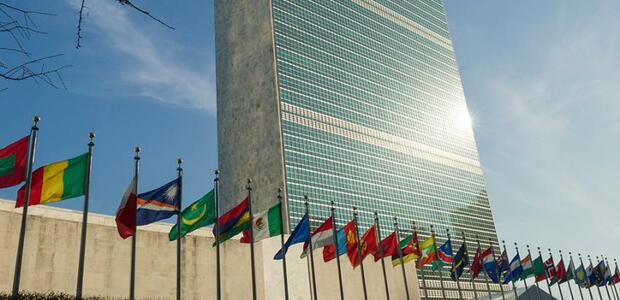 Accelerating progress towards fairer societies
Accelerating progress towards fairer societies
Wed, 4 October 2023
United Nations Headquarters, Room CR 11,
405 E 45th St,
New York, New York,
United States
Past event
Panel discussion
 Accelerating progress towards decent work and fairer societies – joint event with ESCAP
Accelerating progress towards decent work and fairer societies – joint event with ESCAP
Tue, 26 September 2023
ESCAP, CR-4, UNCC,
Rajadamnern Nok Avenue Khwaeng Bang Khun Phrom, Phra Nakhon,
Bangkok,
Thailand
Past event
Panel discussion
 Unpacking the developer's dilemma – panel discussion at ISID
Unpacking the developer's dilemma – panel discussion at ISID
Fri, 24 February 2023
Vasant Kunj Institutional Area,
New Delhi,
India
Past event
Panel discussion
UNU-WIDER at ISA 2022 Annual Convention
UNU-WIDER Senior Research Fellow Patricia Justino and Research Associate Rute Martins Caeiro join in a virtual panel discussion Trust and Governance in Unstable Democracies on 29 March 2022 14:00 - 15:30 (UTC-5) as part of the International Studies...
Tue, 29 March 2022
Online,
Nashville,
United States
Past event
Project workshop
Inequality and governance in unstable democracies – the mediating role of trust: 2nd Annual Workshop
More than 30 participants attended the 2nd annual workshop for ‘Trust and Governance’ project, held virtually on the 16th and 17th April 2020. The workshop was initially set to be held in Colombia but had to be moved to a virtual environment through...
Thu, 16 April 2020
–
Fri, 17 April 2020
Virtual (Zoom),
Past event
Programme
Conference programme: Reducing inequality – the great challenge of our time
Programme for Reducing inequality – the great challenge of our time To watch the videos from the sessions at the conference, watch our playlist here. Spanish version of the programme here. *CEC indicates that this session is part of the VII Colombian...
Seminar
 Erwin Bulte on participatory resource management, elite capture and local livelihoods
Erwin Bulte on participatory resource management, elite capture and local livelihoods
Wed, 18 December 2019
UNU-WIDER,
Katajanokanlaituri 6 B,
Helsinki,
Finland
Past event
Lecture
 Economic development in Asia: Learning from a half-century of transformations
Economic development in Asia: Learning from a half-century of transformations
Wed, 13 November 2019
IIES, A822,
Universitetsvägen 10, 114 18 ,
Stockholm,
Sweden
Past event
Presentation
 Deepak Nayyar Resurgent Asia - Diversity in Development
Deepak Nayyar Resurgent Asia - Diversity in Development
Fri, 15 November 2019
Ministry of Interior, meeting room Kruunu,
Kirkkokatu 12,
Helsinki,
Finland
Past event
Conference
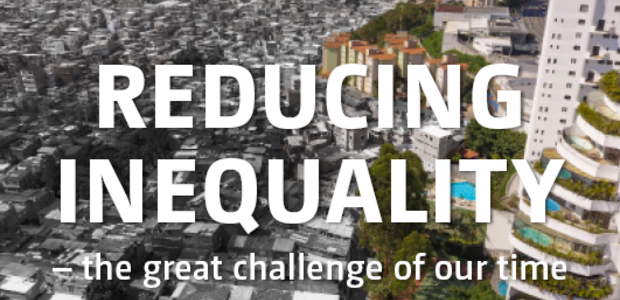 Reducing inequality – the great challenge of our time
Reducing inequality – the great challenge of our time
Wed, 5 October 2022
–
Fri, 7 October 2022
Universidad de los Andes,
Carrera 1, Calle 18a,
Bogotá,
Colombia
Past event
Working Paper
Measuring multidimensional inequality of opportunity
This paper develops a normative approach to the measurement of ex-ante inequality of opportunity in a multidimensional setting—that is, when the individual outcome is represented by a multidimensional variable. We characterize three classes of social...
Blog
Why is inequality in South Africa higher than in Germany?: Explaining income distributions with ‘decompositions’

by
Carlos Gradín
March 2020
The understanding of inequality requires the analysis of changes in income distributions across countries and over time as well as the identification...
Blog
UNU-WIDER at 35: Letter from the Director
2020 promised to be a big year for UNU-WIDER, with the celebration of our 35th anniversary, the 45th birthday of UNU, and 75 years of the UN. But as...
Journal Article
Snakes and ladders and loaded dice
Longitudinal surveys allow us to understand how markers of (dis)advantage determine present material welfare and economic upward or downward mobility over time. In this paper, we use five waves of panel data to empirically assess the extent and...

 Join the network
Join the network







